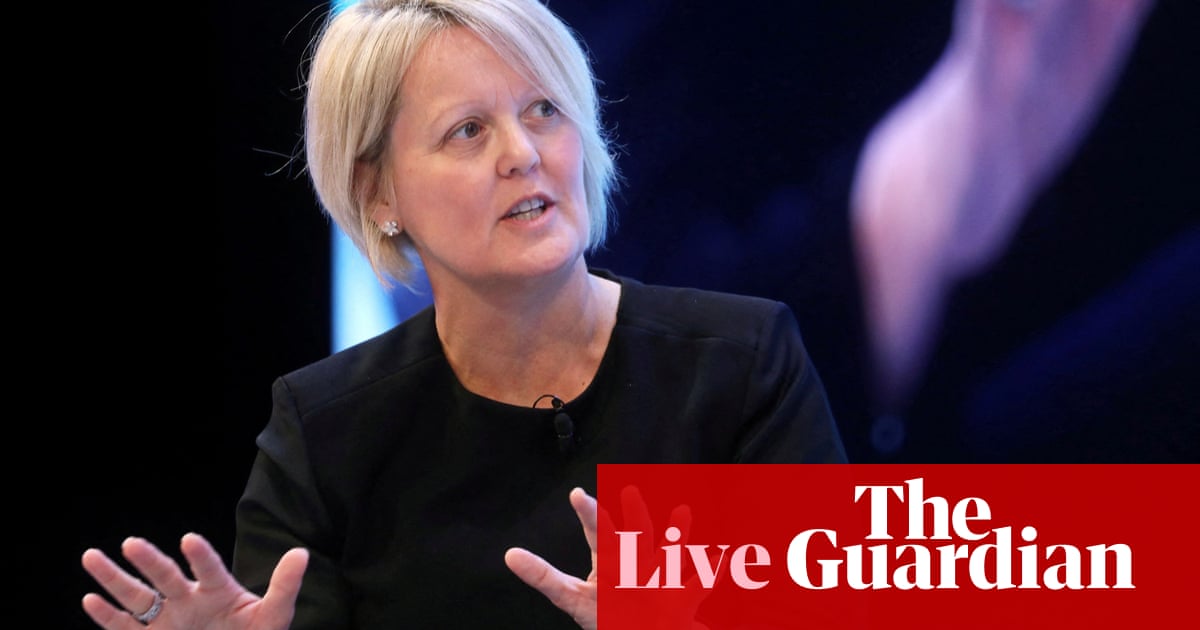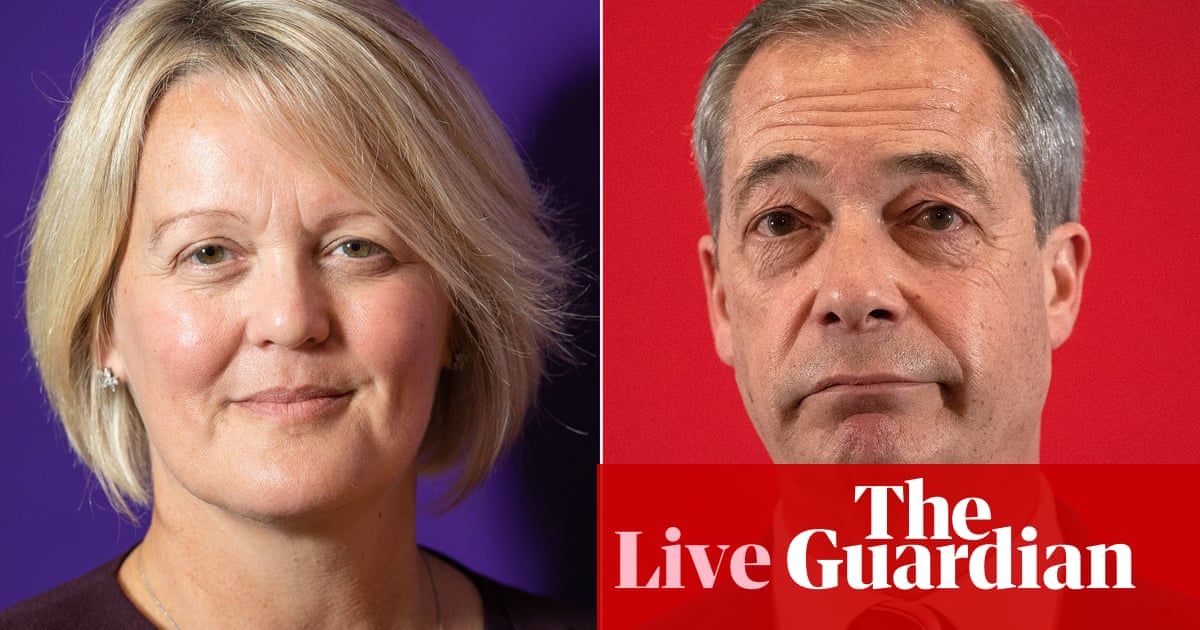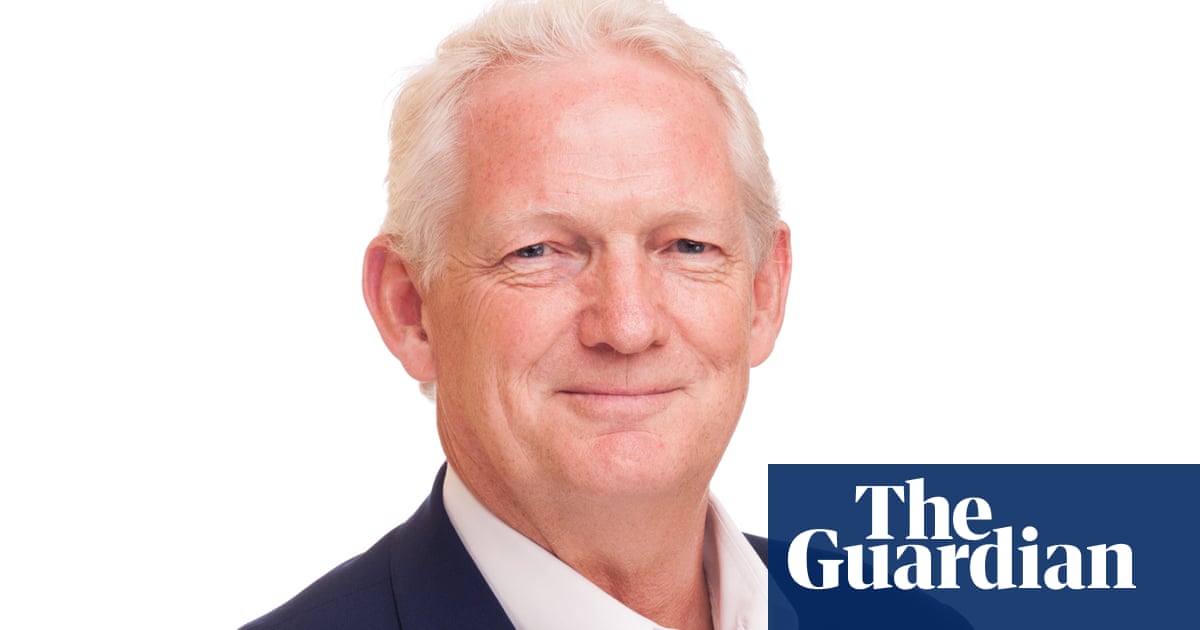
Closing summary: Farage controversy rumbles on after NatWest chief resigns
The controversy over the closure of Nigel Farage’s Coutts bank account has done for Alison Rose, who resigned as NatWest chief executive after admitting she discussed the case with a BBC reporter. Yet it appears the discomfort for NatWest Bank is not over.
The information commissioner has said he will look into a complaint, following media reports of NatWest Bank sharing personal financial information about Nigel Farage with the BBC.
And some shareholders have – anonymously, so far – suggested that the bank’s long-serving chair, Howard Davies, may also need to go.
For his part, Farage, the former right-wing politician turned broadcaster, has called for the whole board of NatWest to be replaced, plus the chief executive of its Coutts subsidiary (while praising the government for intervening on Tuesday night shortly before Rose’s resignation).
Even if replacing the whole board is unlikely, the forced departure of a FTSE 100 chief executive is undoubtedly a major moment.
In other business news today:
Shares in Rolls-Royce have risen to their highest since the start of the coronavirus pandemic after it surprised investors with a big jump in expected profits on the back of high demand in its jet engine and defence businesses.
Heathrow airport has said it remains loss-making despite having some of its busiest days on record during the first half of the year as travel demand continued to bounce back from the Covid crisis.
ChatGPT developer OpenAI, Anthropic, Microsoft and Google, the owner of the UK-based DeepMind, four of the most influential companies in artificial intelligence, have announced the formation of an industry body to oversee safe development of the most advanced models.
The online health and beauty retail platform THG has emerged as the unlikely possible buyer of struggling London the free newspaper City AM.
Energy suppliers could be forced to keep customer service lines open on evenings and weekends this winter under rules proposed by the regulator for Great Britain to help struggling customers.
You can continue to follow our live coverage from around the world universe:
In UK politics, Rishi Sunak appears at infected blood inquiry amid criticism over government compensation delays
In extraterrestrial news, the US Congress is to examine claims government is harboring alien space craft
In the US, Republicans expected to roast homeland security secretary Alejandro Mayorkas in House hearing as they edge towards impeachment
In our coverage of Russia’s invasion of Ukraine, the EU is to ban exports of battlefield equipment to Belarus, and Ukraine will spend $1bn making drones
Thanks as ever for following our coverage on the live blog today, and please do join the inimitable Graeme Wearden for more tomorrow morning. JJ
The Information Commissioner’s Office (ICO) has also written to the main British banking lobby group, UK Finance, to “remind them of responsibilities on information they hold”, it said.
Banks have a duty to uphold data protection laws while holding large amounts of sensitive information, the ICO said.
John Edwards, the UK’s information commissioner, said:
I have written to the banks today to remind them of their responsibilities to the public. Banks should not be holding inaccurate information, they should not be using information in a way that is unduly unexpected, and they should not be holding any more information than is necessary.
Even the information banks gather around politically exposed persons must follow the law. We are working with HM Treasury, who set the rules in this area, and with the Financial Conduct Authority, who oversee those rules.
Data watchdog to investigate complaint after NatWest boss discussed Nigel Farage details
The UK’s information commissioner has said it will investigate a complaint, after reports that NatWest shared personal financial information about Nigel Farage with the BBC.
The Information Commissioner’s Office (ICO) said it would follow normal processes with regards to an unspecified complaint, and would give the organisation involved the opportunity to respond.
The ICO, which oversees UK data protection, did not say who had raised the complaint, although it did say that Nigel Farage’s experience showed the importance of rules allowing individuals to request their personal data held by companies.
John Edwards, the commissioner, said:
The banking duty of confidentiality is over a hundred years old, and it is clear that it would not permit the discussion of a customer’s personal information with the media.
We trust banks with our money and with our personal information. Any suggestion that this trust has been betrayed will be concerning for a bank’s customers, and for regulators like myself.
On the complaint raised with the ICO, Edwards added:
This case is out of the ordinary in terms of its profile, but it is important that we follow our usual processes and procedures. This means that an organisation would be given a chance to respond to a complaint before the ICO gets involved.
The FTSE 100 is down by 0.6% today – not helped by the decline in bank share prices following Lloyds’s profits drop and the resignation of Alison Rose from NatWest (which is now down 4%).
But at the other end there has been a really notable move for a FTSE 100 company: Rolls-Royce shares have soared by 18%. The yellow vertical line on the right-hand side of this five-year graph shows the move.
Shares in Rolls-Royce have risen to their highest since the start of the coronavirus pandemic after it surprised investors with a big jump in expected profits on the back of high demand in its jet engine and defence businesses.
The FTSE 100 engineering firm said its civil aerospace and defence units had reported higher sales and “cost efficiencies” that improved profitability, in an unscheduled trading update on Wednesday morning.
Rolls-Royce’s chief executive, Tufan Erginbilgic, took over at the start of the year with a mandate to raise its profits, which had lagged behind competitors before pandemic travel restrictions caused a dramatic slump in its earnings.
THG emerges as unlikely suitor for free newspaper City AM
The online health and beauty retail platform THG has emerged as the unlikely possible buyer of struggling London the free newspaper City AM.
The newspaper, which distributes 70,000 copies a day targeting financial workers, put itself up for sale at the start of this month. This week it was reported that it was close to collapsing into administration.
London-listed THG – formerly known as the Hut Group and the owner of retail sites including LookFantastic, Cult Beauty and Myprotein – is in advanced talks to buy City AM, as first reported by Sky News’s City editor, Mark Kleinman, who writes a column for the freesheet.
It is understood that the purchase, if it goes ahead, could be announced later on Wednesday.
City AM’s staff are expected to be kept on, and it is understood that the newspaper would retain its editorial independence.
The departure of Dame Alison Rose from NatWest Group with immediate effect further thins the ranks of an already very select group: female FTSE 100 chief executives.
The remaining nine chief executives are, by our count:
Margherita Della Valle, chief executive of Vodafone
Debra Crew at the world’s biggest spirits maker Diageo
Amanda Blanc at the insurer Aviva
Dame Emma Walmsley at the drugmaker GSK
Jette Nygaard-Andersen at the gambling firm Entain
Liv Garfield at the water company Severn Trent
Jennie Daly at the housebuilder Taylor Wimpey
Milena Mondini de Focatiis at the insurer Admiral
Louise Beardmore, at United Utilities, the UK’s largest listed water company
There are also two female chairs in the index’s investment trusts: F&C’s Beatrice Holland, and Pershing Square’s Anne Farlow. Alison Brittain retired from Whitbread in February, while Fiona McBain left the chair of Scottish Mortgage Investment Trust in March.
Victoria Scholar, head of investment at interactive investor, an online share trading platform, said:
As the first woman to take the top job at one of the big four UK banks back in 2019, this is a sad moment for female representation and means that the small handful of women leaders within FTSE 100 companies just got smaller. She was a role model to many and a champion of diversity and inclusion. But clearly her discussions with a journalist about Farage breach client confidentiality and mean her role as CEO is no longer tenable.
Morningstar published a handy analysis in March. The numbers have shifted slightly, but the message is still much the same:
There are six Andrews or Andys, six Simons, four Davids, and five Stephens or Steves. There are almost as many Andrews and Simons as female chief executives.
Please do @ me on Twitt… sorry, X if I’ve missed any.
The controversy surrounding NatWest’s closure of Nigel Farage’s accounts have hurt public trust in the banking sector, bosses said, after they were summoned to a meeting by the City minister on Wednesday.
The comments came following a virtual meeting of 19 UK banking bosses, including Barclays UK’s Matt Hammerstein, HSBC UK’s Ian Stuart, and NatWest’s CEO of retail banking David Lindbert, “to discuss the importance of protecting lawful freedom of expression for customers accessing banking services.”
It also came after the Treasury announced reforms to the notice and explanations customers receive on bank account closures. The changes, which came in reaction to the Farage controversy, will require banks to explain why they are shutting customer accounts - except in cases where it clashes with financial crime investigations - and give 90 days notice before shutting accounts.
The Treasury also raised the issue of checks on politicians and their family members, which is being investigated by the Financial Conduct Authority (FCA), the City regulator. The Treasury said in its briefing that:
The importance of proportionate implementation of requirements around Politically Exposed Persons (PEPs) was raised. The minister said that he fully supported the FCA’s current review in this area, running alongside the Treasury’s planned legislative changes, and encouraged all to work with the Treasury and the FCA at pace on this important matter.
The economic secretary will be holding further such sessions with the remaining industry leaders in the future whilst officials will be holding working groups with participants of the sector to implement the reforms and offer practical guidance.
The National Crime Agency (NCA) was also in attendance at the briefing. It comes amid growing concerns that the reforms could have damaging consequences for fighting financial crime.
Bank bosses tell government NatWest controversy has "damaged trust"
Bank bosses have told the government that the controversy over the closure of Nigel Farage’s Coutts bank account has damaged trust in the sector.
Andrew Griffith, economic secretary to the Treasury, this morning met UK banking leaders to “discuss the importance of protecting lawful freedom of expression for customers accessing banking services”, the Treasury said in a readout from the meeting.
The Treasury said:
Attendees from the sector acknowledged that recent events had impacted upon public trust for the whole sector and expressed their clear commitment to government policy on account closure and to act quickly to restore confidence.
All participants committed to the principle of non-discrimination based on lawful freedom of expression, and to bringing their policies in line with the planned government reforms where needed as soon as possible, even anticipating the new regulations where possible to do so. They also committed to working constructively with government, law enforcement, and the FCA to enable effective implementation.
The attendees were:
Matt Hammerstein, CEO – Barclays
Ian Stuart, CEO – HSBC
Philip Robinson, Managing Director (Personal Current Accounts and Payments) – Lloyds Bank
Debbie Crosbie, CEO – Nationwide
David Lindberg, CEO (Retail Banking) – NatWest
Mike Regnier, CEO – Santander
Sheldon Mills, Executive Director (Consumers and Competition) – Financial Conduct Authority
James Babbage – National Crime Agency
NatWest shares are still down by 3.3% – which now makes the bank the biggest faller on the FTSE 100.
Yet it should also be noted that Lloyds is also down by 3%. That will almost certainly be due to the fall in profits and gloom over the outlook at the bank.
From the point of view of investment analysts, the Nigel Farage bank account controversy could “cast a shadow over share price performance in the near term”, said Gary Greenwood of Shore Capital, an investment bank.
Overall, this is a very sad end to what had up to now been a productive period of leadership for Ms Rose, during which the operational and financial performance of the Group had significantly improved, albeit with the more recent help from a tailwind of rising interest rates.
He said the bank “remains an undervalued stock”. He has a price targe of £2.51 on the shares, compared to its £2.42 price on Wednesday.
Alison Rose has reportedly been kicked off Rishi Sunak’s revamped business council – which only launched last week.
The Daily Telegraph reported that a No 10 spokesman said:
Following her resignation as CEO of NatWest Group, the government has confirmed that Alison Rose is no longer a member of the prime minister’s business council.
Many MPs or their families have been turned down by banks because of “politically exposed persons” (PEP) rules, the policing minister, Chris Philp, has said.
“It is not spoken about much but if you look at almost any member of parliament they will have had an experience like this, I think the Nigel Farage case is an extreme one, but I’m afraid it’s not unique,” Philp told Sky News on Wednesday.
Asked if he had faced difficulties accessing financial services, Philp said his family had, but declined to go into detail.
MPs to investigate banks withdrawing accounts
Cross-party MPs from the All Party Parliamentary Group (APPG) on Fair Business Banking have announced that they are launching an investigation into the scale and practice of banks freezing, withdrawing or withholding bank accounts, following the NatWest saga.
The APPG is asking companies, individuals and banking professionals to come forward with case studies about how and why banking facilities might be denied and what impact this is may be having on businesses and the wider economy.
The investigation is being launched with support from City law firm Humphries Kerstetter LLP.
William Wragg, Tory MP and co-chair of the APPG, said:
The banking industry holds a unique position in our economy, sitting between a service provider and a utility company. This position comes with unique responsibilities, to support economic activity but also to fight financial crime.
Navigating what can be competing priorities is not easy and is therefore something that merits input from a wide variety of players, something we are calling for today.
Keir Starmer says Alison Rose was right to resign as NatWest boss
Labour leader Keir Starmer has said Alison Rose had to resign as NatWest boss after discussing Nigel Farage’s banking details with a BBC reporter.
Speaking on BBC Radio Five Live, Starmer said nobody should be refused banking services on account of their political views, the Guardian’s Andrew Sparrow reports.
NatWest got this one wrong. And that’s why Alison Rose had to resign.
Asked if he felt sorry for Nigel Farage, Starmer said:
Yeah, he shouldn’t have had his personal details revealed like that. It doesn’t matter who you are, that’s a general rule.
I certainly don’t think anybody should be refused banking services because of their political views, whoever they are.
Asked if banks had too much power when it comes to individuals, he said:
I’m surprised to hear these stories of banks taking into account political views, if indeed they are. I don’t know that we’ve got to the bottom of this. But that shouldn’t happen and certainly shouldn’t be a reason for refusing someone banking services.
Alison Rose is “personable, engaging and otherwise competent,” writes the Guardian’s Nils Pratley. “But her position was untenable. She had to go.”
The Farage farrago also raises questions for NatWest’s board, and its chair, Howard Davies, he writes. (Farage himself has called for Coutts chief executive Peter Flavel to be removed as well as the entire NatWest board.)
The central issue is the breach of confidentiality, Nils Pratley writes:
Can Rose say in all honesty that she would have looked leniently on a NatWest employee in similar circumstances? And could the board of NatWest claim the same? Unlikely.
That is the central point in the latest chapter of this bizarre tale. The wider affair has many layers – such as banks’ obligation to treat customers fairly if they wish to close accounts – but the angle specific to Rose was about confidentiality. If NatWest’s privacy policy is as strict as it is presented, it has to be seen to apply to all employees. A junior member of staff would expect to lose his or her job. In expressing its “full confidence” in Rose on Tuesday evening, the NatWest board and its chair, Sir Howard Davies, looked as if they were giving the chief executive special treatment.
If Rose was naive in briefing the BBC, the board of NatWest was doubly so in thinking she could survive without the backing of the chancellor and Downing Street. When your bank is 39% owned by the state, you have to carry political support when the stakes are this high. It is astonishing that Davies, a former regulator and one of the FTSE 100’s most experienced chairs, seemingly ploughed on regardless. Rose and the board were undermined within hours by reports of concerns from the Treasury and No 10, leading to the U-turn in the middle of the night.
Darren Jones, the Labour MP who leads the business select committee, has said the government only got involved in the NatWest row because of “the power Farage seems to have over the Tories”.
He said that Alison Rose “did something wrong”, but contrasted the government intervention in the Farage row with the lack of action in other corporate scandals – notably at the Post Office, which is 100% owned by the government.
Jones also cited the examples of the chief executives of P&O Ferries (which sacked its workers without consultation), Avro Energy (which collapsed), Royal Mail (which has been roiled by disputes between workers and leaders), and Thames Water (which built up debts before nearing collapse) as times when government intervention would have been warranted.












